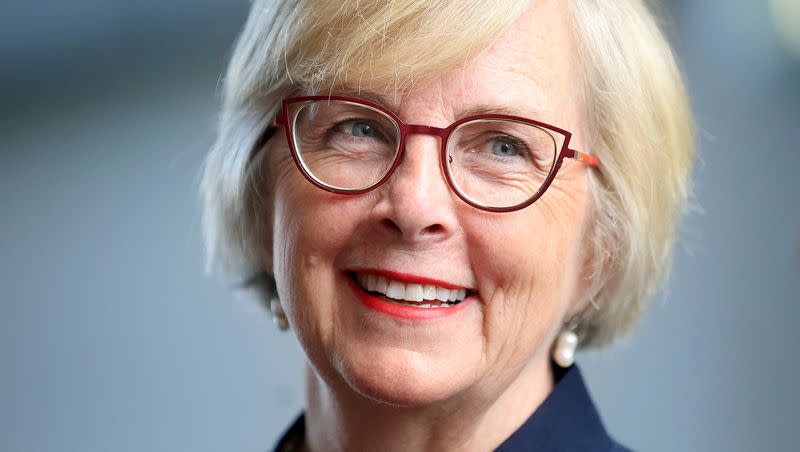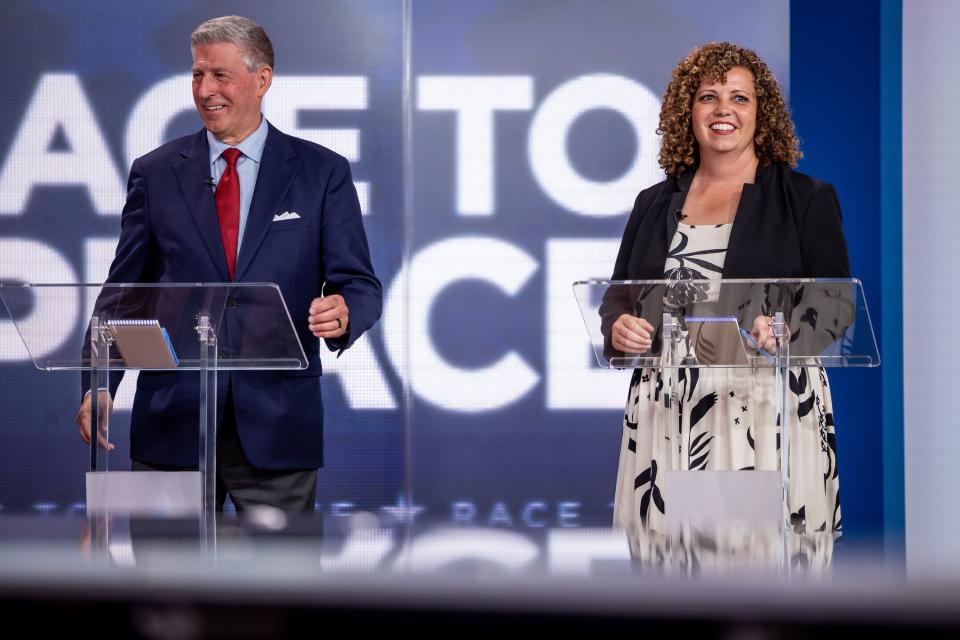New poll: Almost half of 2nd District voters undecided, Becky Edwards leads among 3 GOP candidates

The winner of next week’s Republican primary in the sped-up election cycle to replace Rep. Chris Stewart will be anyone’s guess.
Nearly a majority, 47%, of 2nd Congressional District Republicans who plan on voting in the Sept. 5 special primary election are undecided as to which of the three Republican candidates they will vote for, according to the latest Deseret News/Hinckley Institute of Politics poll.
But the results also show that one candidate has a clear advantage among certain segments of the voting pool.
Former state lawmaker and U.S. Senate candidate Becky Edwards leads her GOP opponents, with 32% of respondents saying they would vote for her if the primary were held today, compared to 11% of respondents who said they would vote for entrepreneur and party committeeman Bruce Hough and 9% who said they would cast their ballot for former Stewart staffer and GOP convention winner Celeste Maloy.
The poll of 471 registered 2nd Congressional District Republican voters was conducted by Dan Jones & Associates from Aug. 7-14. It has a margin of error of plus or minus 4.51 percentage points.
Mail-in ballots were sent to 2nd District voters on Aug. 15 — one day after the poll was completed. This means the poll likely reflects a snapshot in time before many voters fully engaged with the race.

“This is such a unique race because of the timeframe and the limited ability that these candidates have had to truly get a message throughout the 2nd Congressional District,” said Jason Perry, director of the Hinckley Institute of Politics at the University of Utah.
“A consistent dynamic of a special election is there’s always a candidate or two that people don’t know very well,” Perry said. But, he added, “this is a pretty big ‘don’t know’ for being so close to the election time.”
What’s more, Perry said, while people remain uncertain about who they will vote for, ballots have already been mailed out and are already sitting on voters’ counters. This means the different strategies used by Edwards, Hough and Maloy to reach voters over the coming days will have an immediate impact as people make their final decisions, Perry said.
Maloy and Hough participated in a rigorous schedule of 11 debates over the past few weeks. The first 10 took place between Aug. 4 and Aug. 15 — overlapping with the time the poll was conducted — and were organized by Maloy in concert with local Republican parties across the state.
The debates culminated in a live televised debate on KSL one day after the poll was completed. The two gathered for one final debate in West Valley on Aug. 23.
Edwards did not attend any of the debates, with a spokesperson saying they were her “opponent’s campaign events.” Instead, she opted to hold her own voter outreach events, sometimes with several scheduled each day.

“We are optimistic about the results of the poll and thrilled with the tremendous support we’ve received this far,” said a spokesperson for the Edwards campaign in a written statement. “We know from talking to thousands of voters across the district that Utahns are ready to send a proven, common-sense conservative to Washington.”
All three candidates have made efforts to reach out to undecided voters in the two weeks since the poll was taken.
Edwards launched a TV and radio ad campaign at the beginning of August, paid for by the more than $300,000 she raised in the second quarter of 2023, with $100,000 of that money coming from a loan Edwards made to her own campaign.
“We’re confident in our ability to connect with the undecided voters in the 2nd District,” Edwards’ spokesperson said. “Our strategy in the days leading to the election ... (includes) personally connecting with voters at their doorsteps, in group settings, and on the phone, engaging in meaningful conversations about the issues that matter most to them.”
Hough also made a substantial donation to his own campaign. Of the more than $500,000 he has raised as of Aug. 16, more than $334,200 of that came from a loan he made to his campaign.
Hough’s campaign has invested in Fox News ads as well as talk radio ads. His social media includes several well-produced videos and graphics, most of which include attacks on Edwards for her record of voting for Democratic presidents or Maloy for her failure to vote in recent elections.
“It’s basically a deal-killer for so many people who want to vote for the authentic Republican candidate,” Hough told the Deseret News.
Hough also said he has reservations about poll results gathered during such a rapidly moving campaign.
Hough called the poll “stale,” and said his campaign has done polls, “and they all show a much stronger position for our campaign and our trending is very much on the positive trajectory. And we expect to win.”
Maloy has raised over $300,000 so far and she has not loaned her campaign any money. She has also launched an ad campaign, with placements on TV, radio and online, “Just not as much as my competitors have,” she said.
“I haven’t taken my foot off the gas,” Maloy said. “I’m just going to keep working, keep being optimistic, keep getting my message out there and we’ll see what happens on the 5th.”
After her surprise win at the GOP convention, Maloy says she has more confidence in her chances at another upset than she does in poll results.
“What I’m seeing when I’m out talking to people is a groundswell. At the grassroots level there’s a lot of enthusiasm for my campaign and I trust that more than I trust a poll,” she said.
Perry attributes Edwards’ lead to her high name ID, developed over five terms in the state House of Representatives and during her bid to unseat Sen. Mike Lee in last year’s GOP primary.
“Becky has a substantial advantage,” Perry said. “She not only has held office before, but has has built her name ID through a Senate race.”
Edwards also has been able to rely on an already existing network of volunteers and an expansive social media presence to get her message out, which is likely one reason she chose not to participate in the debates with Hough and Maloy, Perry said, and the reason why her decision to focus her campaign along the northern Wasatch Front seems not to have hurt her.
According to the poll, Edwards is performing disproportionately well among self-described moderate Republicans. Nearly half, 43%, of moderates said they would vote for Edwards if the primary were today, with 4% saying they would vote for Hough and 1% for Maloy. The remaining 52% are undecided.
Edwards maintains her lead among those who consider themselves as “somewhat conservative” and “very conservative,” receiving 28% and 20% of these voters’ support, respectively. Hough received the support of 14% of those who are somewhat conservative and 18% of those who are very conservative, with Maloy trailing at 10% and 13%, respectively.
But the most important number to look out for, according to Perry, is the “huge percentage of people — on the entire political spectrum — for them to make their case to over the next few days.” Half of the respondents in each of the three ideological categories said they were undecided.
To reach these voters, candidates should focus on two things, Perry said: getting people to show up in what is normally a low-turnout election cycle and differentiating yourself from the other candidates on the issues.
“All ends of the Republican spectrum are up for grabs right now,” Perry said. “And to those people in the state of Utah who right now don’t know, you are going to be a deciding factor in this race.”

